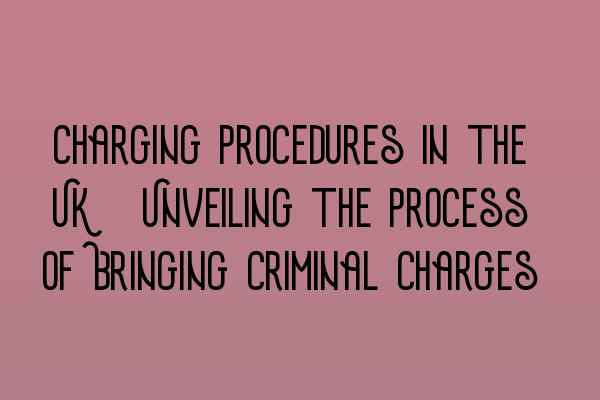Charging Procedures in the UK: Unveiling the Process of Bringing Criminal Charges
Gaining an understanding of the charging procedures in the UK is crucial for anyone involved in criminal law. Whether you are a solicitor providing legal advice, a law student studying criminal law, or simply have a general interest in the UK’s legal system, this comprehensive guide will walk you through the process of bringing criminal charges.
1. Investigation Stage
Before criminal charges can be brought, a thorough investigation is conducted by the police or other law enforcement agencies. This stage involves gathering evidence, interviewing witnesses, and examining any available forensic evidence.
Keywords: investigation, criminal charges, police, law enforcement agencies, evidence, witnesses, forensic evidence
2. Arrest and Detention
If the investigation yields sufficient evidence to establish a reasonable belief that a crime has been committed, the police may arrest and detain the suspect. The suspect is informed of their rights and is entitled to legal representation.
Keywords: arrest, detention, suspect, reasonable belief, crime, rights, legal representation
3. Charging Decision
Once the suspect is in custody, the evidence gathered during the investigation is reviewed by the Crown Prosecution Service (CPS). The CPS assesses whether there is sufficient evidence to charge the suspect and, if so, determines the appropriate charges to bring.
If the CPS decides not to bring charges, the suspect may be released without further action. However, if charges are brought, the suspect will proceed to court.
Keywords: charging decision, custody, Crown Prosecution Service, CPS, evidence, charges, court
4. Court Proceedings
When charges are brought, the case will be presented in court. The defendant, now formally charged, will have the opportunity to enter a plea of guilty or not guilty. If the defendant pleads guilty, the court will proceed to sentencing. If the defendant pleads not guilty, a trial will be scheduled.
During the trial, both the prosecution and the defense will present evidence and call witnesses. The judge or jury will then assess the evidence and make a determination of guilt or innocence.
Keywords: court proceedings, charges, defendant, plea, guilty, not guilty, sentencing, trial, prosecution, defense, evidence, witnesses, judge, jury, guilt, innocence
5. Sentencing
If the defendant is found guilty, the court will proceed to sentencing. The judge will consider various factors, including the seriousness of the offense, the defendant’s criminal record, and any mitigating or aggravating circumstances. The judge will then impose an appropriate sentence, which may include fines, imprisonment, community service, or other penalties.
Keywords: sentencing, guilty, judge, offense, criminal record, mitigating circumstances, aggravating circumstances, fines, imprisonment, community service, penalties
Understanding the charging procedures in the UK is essential for legal professionals and individuals navigating the criminal justice system. By familiarizing yourself with each stage of the process, you can effectively advise your clients or protect your rights if you find yourself facing criminal charges.
